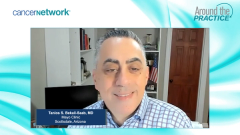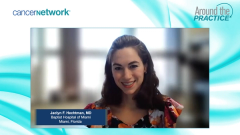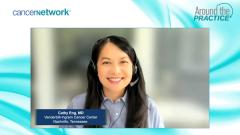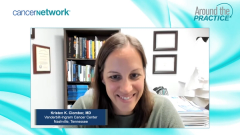
Metastatic CRC: Unmet Needs and Future Directions in Care
Closing out their review of the metastatic colorectal cancer treatment paradigm, expert panelists consider how the treatment armamentarium will continue to evolve.
Episodes in this series

Transcript:
Cathy Eng, MD: In closing, a couple of comments. Dr Ciombar, what advice do you have for community colleagues treating colorectal cancer and what are your recommendations, just very briefly, in regards to either molecular testing or in regards to sequencing.
Kristen K. Ciombor, MD: That's a great question. What we've seen a shift in in the last few years is – say 10 years ago when we started doing molecular testing routinely, it was mostly for selection into clinical trials. And I remember at that time even saying, well this patient may not be eligible for a clinical trial. Why should we send molecular testing because it wasn't actionable other than MSI and even RAST to some extent. But now, that has been a huge shift, not only because there are currently FDA approved therapies which we need to be able to offer to our patients and know who is eligible for these. There are prognostic biomarkers, even if it doesn't – it should change how you treat patients. But, even if it doesn't, you can get good information for patients about how they are likely to deal with their disease. And the final point is that many of these options are now first-line options. It's incredibly important that, as soon as the patient is diagnosed, that we get this information. As Dr Hechtman mentioned, we have lots of ways to test these actionable biomarkers. Some are inhouse, some are send-away, NGS versus IHC and all these others. And we really must have a good flow of – a workflow, to make sure patients are getting timely molecular testing because it really will impact all of their therapy throughout their whole disease course.
Cathy Eng, MD: Thank you. I'm just going to give you guys one last opportunity in closing. Kristen did mention this a little bit about future perspectives, but do you see any other unmet needs that we have not mentioned that you would love to see addressed? I know I would love to see more clinical trials allow one prior line of standard chemotherapy because then, that way community doctors don't feel pressured that they can't get their patient in time, and yet their patient is asking to get started on treatment. But yet you still want to send the patient to enrollment. I would love to see that. And I would personally love to see that all trials that require patients to have EGFR therapy, I would love to see if they've already been tested as well for HER2, right? Because, once again, going back to why should we give these patients EGFR therapy if it may not benefit them. That's what I would love to see. I'd love to hear from all of you. Dr Hechtman, would you like to go first?
Jaclyn F. Hechtman, MD: If you were at a referral center, and the patient is coming from somewhere else and their tissue is being sent. If it's helps with time, maybe having the blocker unstained slide sent then, rather than having than having to just have the H and E's and then requesting that because it delays. We can't do it without the unstained slides re-blocked. And then, not hesitating to reach out to molecular pathology or surgical pathology because sometimes they can guide you in which action might be most appropriate for the amount of tissue you have or the amount of time, you're looking to get a result in. For example, NGS might take a lot longer than IHC. And if you're just looking for a specific biomarker, we you there. But if it's a very limited amount of tissue we might guide you in which way to go.
Cathy Eng, MD: I love that. Thank you so much. Dr Saab?
Tanios S. Bekaii-Saab, MD: Not to reiterate everything that was said, but we need to continue to educate our colleagues and our patient advocacy group about the importance of genetic testing about also the nuances of what it means. Also, we must continue educating our community, both practitioner and patients and advocacy groups, about some of the elements of our research that do require confirmation. We brought, initially, the whole question about minimal residual disease assessment in certain settings and the importance not to jump the gun and start using it left and right, indiscriminately without validating this in perspective trials. Not that it doesn't have a role, in clinic it does, but it's a very limited role at this point of time. And finally, I will endorse your statement regarding being a little bit more real-world friendly with our clinical trials. That includes, essentially, being more flexible. It also means that we need to ensure that we have a presentation on our clinical trials that is reflective of the diversity of our patient population.
Cathy Eng, MD: Thank you so much. And in closing, Dr Ciombar?
Kristen K. Ciombor, MD: I completely agree with what everyone has said. I would just add one thing in terms of looking forward and what our unmet needs are. As we get initial good data that we now have and are obtaining in these molecularly targeted subsets, now we need to know what to do next. We need to understand mechanisms of resistance and that's a whole challenge in and of itself. I realized I never answered one of the questions you posed to me earlier about HER2 and whether we re-test after prior anti-HER2 therapy. And it made me think, because we do that a lot in gastric because the HER2 implication can be really hetergenius after initial therapy. We don't tend to do that in colon, but there could be – that’s an area of exploration because, say after initial anti-HER2 therapy and patients initially do well, then they progress prior to using something like an antibody drug conjugate that has the payload, the chemotherapy payload. Maybe that could help increase response to drugs like that. We also know in the anti-GFR space that sometimes – because with removal of the selective pressure of the anti-GFR agent where RAS mutations can accumulate over time leading to resistance, sometimes you take that pressure away and you can re-challenge later and get more bang from your buck from that agent. Understanding that is going to be very tricky but very worthy of our research in understanding not only how patients can benefit at first with these molecularly charged agents, but also how we can treat them beyond progression on those agents as well.
Cathy Eng, MD: Thank you so much. I appreciate all of you. I thought this was a wonderful discussion. I would like to thank our faculty once again, Dr Hechtman, Dr Saab, and Dr Ciombar, for joining us in this lively discussion on the treatment of patients with metastatic colorectal carcinoma brought to you by Cancer Network. And thank you to our viewing audience. We hope you found this interactive discussion to be informative and beneficial to your clinical practice. Thank you once again for joining us.
Transcript edited for clarity.
Newsletter
Stay up to date on recent advances in the multidisciplinary approach to cancer.












































